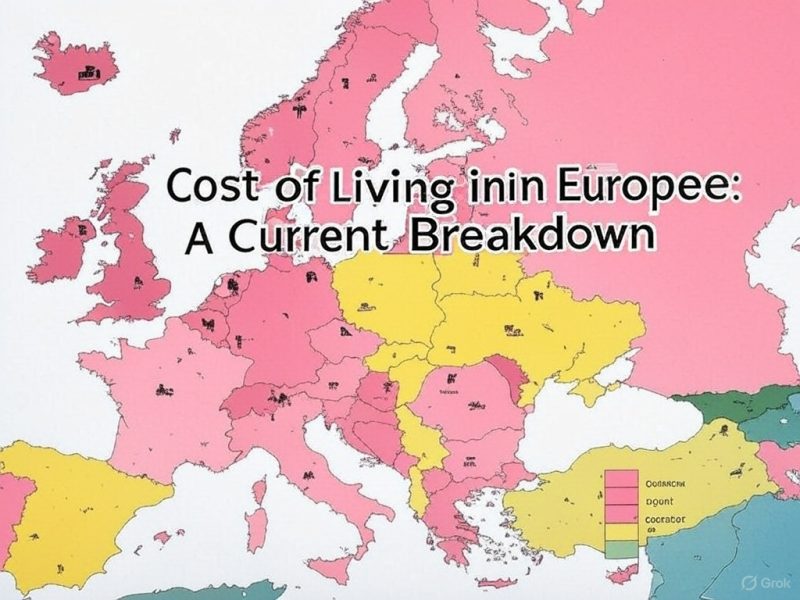Teaching is more than just a job, rather it’s a passion. It opens doors not just for students, but also for the teachers themselves. And if you’re a teacher dreaming about a new life in Europe, the good news is that your skills are needed. Many European countries are actively welcoming qualified educators from around the world. This is because of their aging populations, teacher shortages, and a renewed focus on education.
Moving to Europe as a teacher can give you the chance to grow both professionally and personally. Probably you’re coming from Nigeria, India, the Philippines, or anywhere else, there are many opportunities waiting for you. That’s if and only if you know the right path to take. Of course that’s why we write this article. It might shock you at first, but if you take things step by step, you’ll find that immigrating to Europe as a teacher is very simple. So let’s break it all down and make your dream easier to reach.
An Overview of Teaching in Europe
Europe is a great place to teach, and there are countless options, even if you’re looking to teach early childhood education, secondary school subject areas like math or science, or teaching English as a foreign language (TEFL or TESOL). Some countries have public school systems where you must have a license and speak the local language. Others provide international schools, private academies, or bilingual institutions where they would teach in English or other languages from around the globe.
The beautiful thing about teaching in Europe, is there are options. For example, Germany may be looking for STEM teachers for public schools, while Spain could be searching for native English speakers to employ in language programs. Other countries, including France, Italy, the Netherlands, and Nordic countries, often recruit teachers from outside Europe.
Do you know there is a critical teacher shortage in most countries, and particularly for specialized subjects or in rural areas? If you have the qualifications and are willing to adapt, you are bound to find your options.
General Requirements for Immigrant Teachers
Before you box up your home, it is important to know the requirements you will have to follow. Although each country will have its variation of official rules, here are some general things most countries in Europe will be looking for:
- A Bachelor’s degree (at least) in Education or your subject area
- A teaching license or certification from your home country
- Proof of teaching experience (at least 1-2 years is ideal)
- Language proficiency (English is enough in some countries, others require local languages)
- A clean criminal record and medical certificate
- Work visa or residency permit (depending on where you’re going)
Additional training or certifications like TEFL or QTS (Qualified Teacher Status for the UK) can improve your chances. Some employers also support you through this process once you’ve been hired.
How to Immigrate to Europe as a Teacher
Let’s break this down step-by-step so you can better understand the process and plan accordingly.
Step 1: Choose Your Destination
Start by picking a country based on your language ability, qualifications, and preferences. For example, if you only speak English, you may want to look at the UK, Ireland, Netherlands, Germany, or international schools in Spain or Italy. If you’re willing to learn another language, even more doors open.
Step 2: Research Visa Options and Requirements
Each country has specific visa types for skilled workers. Teachers typically fall under “skilled worker” or “high-demand occupation” visas. For example:
- The UK offers the Skilled Worker Visa
- Germany has the EU Blue Card for high-skilled professionals
- France offers a Talent Passport for teachers and researchers
Then, what’s left to do is to visit the embassy website of the country you’re interested in to find exact visa requirements.
Step 3: Prepare Your Documents
Thirdly, you’ll need your degree certificate, transcripts, professional license, proof of experience (reference letters or employment contracts), police clearance, and possibly translations of all these documents if they’re not in English or the country’s local language.
Step 4: Get Your Qualifications Recognized
Some countries require you to get your teaching qualifications recognized officially. This could involve submitting your documents to a national body for verification or equivalence. In Germany, for example, this is called “Anerkennung” (recognition).
Step 5: Search and Apply for Jobs
Start applying to jobs online through official government education portals, international school websites, or job boards like TES, Glassdoor, or GoAbroad. Focus on schools offering visa sponsorship or that are used to hiring foreign teachers.
Step 6: Attend Interviews and Secure a Job Offer
After receiving interview invitations, ensure you are ready to get hired by researching the curriculum and school culture. Then after receiving a job offer, your employer may offer visa sponsorship and a relocation package as well.
Step 7: Apply for Work Visa and Relocate
Now that you have an acceptance letter, you can make apply for a work visa! Apply with all the required documentation for your visa, participate in any appointments required by the embassy, and once you have your visa; book the flight and begin your European adventure!
Teaching Jobs in Europe with Visa Sponsorship
Being theoretical in study will not guarantee jobs in Europe because many countries are actively providing work visas to address teacher shortages. The UK is a great destination for international teachers, including Math, Physics and Computer Science teachers. If qualified, many schools in Germany, Sweden, and the Netherlands will bring teachers on with visa sponsorship.
While the international schools in Spain, France, and Eastern Europe (e.g., Poland or Czech Republic) are not government schools, the international schools usually hire on good contracts in English and are well-practiced at sponsoring visas for non-EU citizens.
My advice for you when applying for jobs is that, it is always a good idea to search for any jobs with the phrase “visa sponsorship available” or “international applicants welcome.”
Frequently Asked Questions
Let’s answer some of the most asked questions by teachers thinking about moving to Europe:
Which European countries are in need of teachers?
The UK, Germany, Sweden, and Ireland currently have high demand, especially in STEM subjects and English language instruction.
Which European countries pay teachers the most?
Switzerland, Luxembourg, and Germany offer some of the highest salaries for teachers, though cost of living also tends to be higher in these countries.
Does Europe have a teacher shortage?
Yes. Many European countries are facing a shortage of qualified teachers, particularly in rural areas or in subjects like math, science, and technology.
How can a foreigner apply for a teaching job in the UK?
First, check if your qualifications meet UK teaching standards. Then apply for a job with a sponsoring school. If accepted, you can apply for a Skilled Worker Visa through the UK Home Office,
How much do teachers get paid in Germany per month?
Teachers in Germany earn between €3,000 and €5,000 per month before tax, depending on experience, region, and qualifications.
Can a Nigerian get a teaching job in the UK?
Yes, especially if you meet the teaching standards and your subject is in demand. Nigeria is also on the list of countries whose teacher qualifications are recognized by the UK.
What is the 4 year rule for teachers in the UK?
It allows overseas-trained teachers to work in English schools for up to 4 years without QTS (Qualified Teacher Status). After that, you must gain QTS to continue teaching.
What is the fastest way to become a teacher in Europe?
Teaching English (TEFL/TESOL) is very often the quickest route for English speakers. You can become certified in your home country, and then go to find good language schools (or international schools) in Europe and apply directly—this can expedite the process.
Conclusion
If becoming a teacher in Europe is a serious aspiration for you, then now is a better time than ever. Many countries are looking for skilled workers like you, and many are making it easier for workers to immigrate to fill gaps in education. With the right papers, information, and mindset, your dream of teaching English in Europe is close enough to reach out and grab it!
Don’t let the process intimidate you! It may take a little while, but everything that you do along the way will move you closer to where you want to be: living and teaching English in Europe. And the outcome will be a stable, fulfilling job, experiences that you will remember your entire life, and a better life for you!
So don’t wait any longer, start your preparation today, and Europe is waiting for you (chalk in one hand and passport in another hand).





